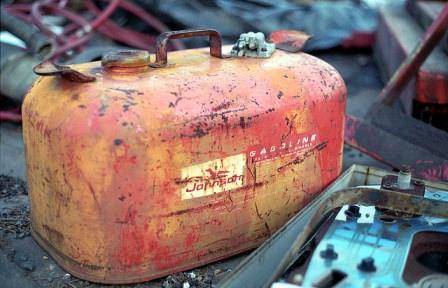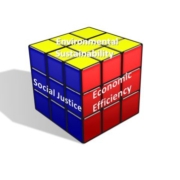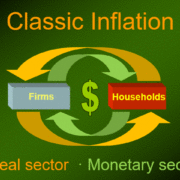A Stick in the Stocking: Santa’s Supply Shock
by Brian Czech
It’s déjà vu all over again: another oil “supply shock.” Seems like we’ve had one every few weeks for the past few months. Santa stuck another one in the Christmas stocking, and by New Year’s Eve crude oil prices fell to Great Recession levels.
Frankly, though, an oil supply shock is hardly . . . well, hardly shocking by now! Furthermore, this is the kind of oxymoronic “shock” people enjoy, or at least most people in a growth-obsessed economy. We have a sudden increase in production and therefore drop in price, due mostly to OPEC. The drop in price sort of undermines the meaning of shock, no? Gas is below $2/gallon. “If such is a shock,” we say, “bring it on!”
Historically, though, the phrase “supply shock” would evoke deprivation, pain, and fear. In the 19th century the most notorious supply shock was the dramatic decrease in the availability of whale oil in the 1860s, due partly to the side-tracking of the New England whaling fleet during the Civil War. Sperm whale oil had been the predominant domestic fuel, used in household lamps as well as for heating, and adjusting to different fuels wasn’t easy.
In the 20th century, perhaps the biggest supply shock was the OPEC oil embargo of 1973. This time, there was no other significant fuel to adjust to, and the embargo resulted in a historic stock market crash. Now that’s a supply shock.
We can see from the examples that a supply shock tends to get its name from the “bigness” of the supply in question. A sudden shortage of smelt wouldn’t warrant a “supply shock” headline, because smelt are a bit player in the economy. A supply shock is more macroeconomic than micro. In the examples above, major fuels were the supplies in question.

Fuel isn’t just any commodity–dramatic changes in its supply can lead to supply shocks. Photo Credit: Bryan Costin
“Fuel” might sound like just another commodity, but the name says it all; it fuels the economy, not just smelt fishing. When the availability of fuel suddenly declines, that’s a shock indeed, a shock to the system, the economic system.
Oddly enough, this latest supply “shock,” resulting in a rapid drop in price, also caused a stock market tumble, just like the OPEC oil embargo. This time it wasn’t a full-fledged crash, at least not yet, but the Dow Jones dropped 315 points the weekend of December 12. We can chalk it up to the general insecurity caused by any major price shift, but we would be prudent to note yet one more case of Wall Street vs. Main Street. Here we all had cheaper fuel–with all that obviously meant for our household budgets–and Wall Street felt threatened.
It would be tempting to turn this into anti-Wall Street polemic, but the inequality of Big Capital is not even the main issue here. Rather, recent talk of “supply shock” is a wake-up call for the sustainability of Big Capital, the little man, and everyone in between. The latest news of cheap oil notwithstanding, we are moving inexorably into the era of Supply Shock, in which natural resources and environmental services become the limiting factors for human wellbeing; so limiting in fact that wellbeing declines quickly and ubiquitously.
Sure, at first glance Santa’s little “supply shock” of 2014 runs in the face of any limits-to-growth argument. But frogs feel fine as the water warms, too. When OPEC pulls out the stops for oil production, with whatever motives it might have–say for example to slap the Russian economy–it’s like a bigger gun to shoot ourselves in the foot with. In this case the gun is the global economy, and the foot is our climate, our biodiversity, and environmental protection at large.
And of course as the environment is whittled away from under us, so too is our kids’ and grandkids’ economy. A growing and then bloating economy is actually a threat to environmental protection, economic sustainability, national security and international stability.
I propose that we stop calling these short-term fuel gluts “supply shocks” and instead call them “supply parties.” We all know the parties must end, and the longer we party, the bigger the real shock, the after-shock, will be. When the suite of resources such as oil, natural gas, minerals, timber, fisheries, soil, rangeland–and oh yes, that cheap thing called “water”–are at a collective all-time low, relative to demand, and when climate change, biodiversity loss, and environmental unravelling are in full swing, and when our agriculture, extraction, manufacturing, and services are devastated by the loss of our natural capital, we’ll know we’re in the age of Supply Shock.
We’ll have been naughty, and Santa will have known. What’s that going to get us?








Very, very plausible. I also believe we have entered a deflationary spiral. As with so much about economics, the current “supply shock” is a counterintuitive sign of trouble to come. Wall St seems aware if not understanding. People say that the ultra rich already have plans to manage future shocks. Personally I think they have buried their heads in the sand deeper than most. But many of us now are catching on to the thought that something is wrong with the economy and the society.
We’ll see if the lower oil price results in a surge of SUV buying, but I doubt that it will happen.
I suggest that it isn’t OPEC that is causing this “supply shock, but the US – it is the US that is dumping all this oil on the market – OPEC hasn’t increased it’s output, it has simply maintained the same levels as before ….
“Oddly enough, this latest supply “shock,” resulting in a rapid drop in price, also caused a stock market tumble, just like the OPEC oil embargo.”
Odd this is surely not. Oil price levels have tracked with the market for years now, and the reason in part is the collateralization of oil as a debt instrument far surpassing the home mortgages that helped bring down the global economic system in 2008. When oil was expected to stay above $100, who would not lend against future production and earnings in the industry, to the companies and countries that own it?
So now we have the threat of another debt market collapse, one significantly worse than the 2008 collapse in the CDO market because hundreds of billions of dollars of junk bonds are also now at risk. Financial leverage is still through the roof, and a new global deleveraging is in order, and with many large defaults in our future.
The basic message here is the fragility of a global economic system based on growth and expansion, debt and price appreciation, ever greater winners and losers, and booms and busts. Nothing is certain anymore except for an ultimate and dire collapse of the social and political structures that underpin the global economy. Is war next?
We are already at war in almost every society, gentrifying, dispossessing, and crushing the life and livelihoods of billions.
Aquifer – Am wondering what your point is exactly. Certainly the US is bringing onto the market a competitive source of crude oil and gas, subsequent to the success of shale oil production through fracking, thereby reducing Western reliance on crude oil sourced from the Middle East.
The thing that is unusual about the OPEC response to this is that, consistently in the past, whenever the supply of oil has put pressure on prices to drop through an over-supply, OPEC has historically and without fail, always reduced its production, deliberately strangling supply lines to force the price upwards, and/or to keep it buoyant. They are doing the opposite now and with deliberate intent. We must examine the reasons why.
It is commonly known that shale gas and oil are expensive to extract from the ground, the reason these deposits have never previously been drilled. The combination of the new technology, fracking, together with high oil prices has made it economical, as never before, to now extract shale oil and gas. If the crude oil price drops too low, drilling for shale oil will again become uneconomical, in spite of the new technology. It is still more expensive to extract oil from these deposits than it is from others such as the type of wells in the Middle East. This is what OPEC is counting on and its sole purpose behind its strategy to NOT reduce production, is to deliberately create an over-supply with the intent of driving crude oil prices low enough to shut down the Western operations in shale oil and gas. In other words, to compel shale oil production to become uneconomical once again.
I agree with all that Brian writes, that the sooner we cease fossil fuel production and the plundering of the planet’s resources the better, for it is killing our planet and, ultimately, will kill us.
However, in the interim, until governments start pro-actively investing in clean energy, the oil price war is a two-edged sword for the West. Should it be compelled to return to reliance on OPEC oil supplies, I cannot see this as a positive, for if Western production shuts down, then OPEC will simply strangle supplies once again to force the price up again and we are back to where we were. Worse, with the rising unrest and incidence of conflict in the Middle East, with control of oil wells now under ISIS and the Taliban, etc. this places unprecedented power in the hands of extremists to control energy supplies to the West. These groups are unpredictable fruitcakes who hate the West and could do anything. The last thing the West can afford is for its oil reliant industries to be at the mercy and behest of these fantics.
All of the above is just another reason for the West to get as fast as possible out of fossil fueled energy reliance and into clean energy production, aside from all of the obvious environmental considerations.
Good thoughts. One suggestion: Climate and biodiversity are not our foot, but our head. The muzzle of the big gun is resting firmly against our neo-cortex…